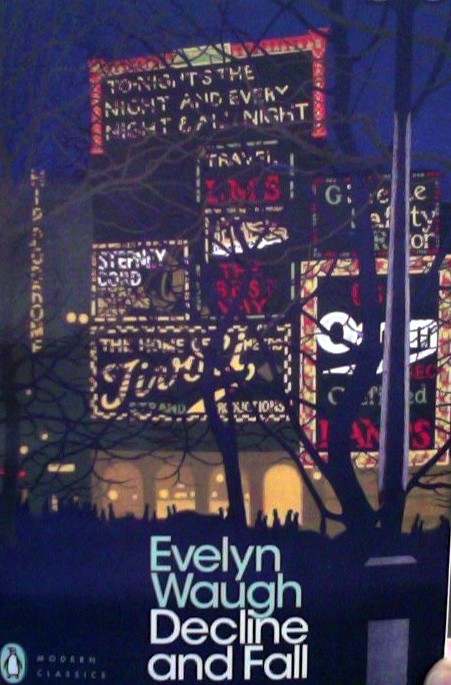Inspiring Older Readers
 posted on 10 Nov 2021
posted on 10 Nov 2021
Rereading Evelyn Waugh’s Decline and Fall
I haven’t always enjoyed Waugh’s early novels. Sometimes they seem as brittle and shallow as the rising generation of bright young things of the 1920s and 30s that they typically lampoon. I have long thought this to be the case with Waugh’s first novel, Decline and Fall, published in 1928 when he was just twenty-five years old. In fact, when I last reread it not only couldn’t I finish it, I didn’t even keep it.
But yet again I have found myself re-buying a discarded title only to discover that the experience of rereading it reveals not just a better book but an almost completely different one than I recalled. This time round, reading Decline and Fall in the smart new Penguin Modern Classics edition pictured, I found it hugely enjoyable. Yet another reminder that mood is extremely important in determining whether we will be receptive to a book.
The central character is unassuming theology student, Paul Pennyfeather, who doesn’t even have the brains – the street smarts – to defend himself when an outrage of the Bollinger Club, an Oxford college ‘dining club’ to which he doesn’t even belong, results in him being sent down in disgrace. An example must be made and as the real instigators are too rich and well-connected to be expelled, Pennyfeather is a convenient scapegoat. Every subsequent ignominy to which he is subjected in this pitch-perfect black farce follows from this opening episode.
I think my previous problems with this novel derive from the fact that the plot is really only a sequence of comic events to fuel the unfolding of Pennyfeather’s disgrace. Like much of Waugh, read too hurriedly or inattentively, it passes in a blur. Its deepest pleasures lie not in the plot but in the tone and comic timing of the novel. Here’s a taste of what Waugh says about the disreputable antics of the Bollinger Club:
“There is tradition behind the Bollinger; it numbers reigning kings among its past members. At the last dinner, three years ago, a fox had been brought in in a cage and stoned to death with champagne bottles. What an evening that had been! This was the first meeting since then, and from all over Europe old members had rallied for the occasion. For two days they had been pouring into Oxford: epileptic royalty from their villas of exile; uncouth peers from crumbling country seats; smooth young men of uncertain tastes from embassies and legations; illiterate lairds from wet granite hovels in the Highlands; ambitious young barristers and Conservative candidates torn from the London season and the indelicate advances of debutantes; all that was most sonorous of name and title was there for the beano.”
Pennyfeather ends up teaching at Dr Fagan’s public school ‘crammer’ at Llanabba Castle in north Wales, the only job he can get, and the cast of grotesques and eccentrics that he meets there recur throughout the rest of the novel in increasingly unlikely circumstances – along with one of Waugh’s best female creations, the utterly unscrupulous Margot Beste-Chetwynde, the mother of one of his pupils. I am not giving too much away if I say that Pennyfeather narrowly fails to marry Margot but does serve time in prison for the part he inadvertently plays in her Latin-American Entertainment Company Ltd, which is of course a front for prostitution.
What really makes this novel I think is that it isn’t simply ‘comic writing’: its humour is sophisticated and layered. It’s all in the detail. Here is Waugh introducing the young German architect, Professor Silenus, whom Margot has ‘found’ and employs to remodel her jewel of a Tudor mansion, King’s Thursday:
“He was not yet very famous anywhere, though all who met him carried away deep and diverse impressions of his genius. He had first attracted Mrs Beste-Chetwynde’s attention with the rejected design for a chewing-gum factory which had been reproduced in a progressive Hungarian quarterly. His only other completed work was the décor for a cinema-film of great length and complexity of plot – a complexity rendered the more inextricable by the producer’s austere elimination of all human characters, a fact which had proved fatal to its commercial success. He was starving resignedly in a bed-sitting-room in Bloomsbury…when he was offered the commission of rebuilding King’s Thursday.”
This is the young Waugh, intent it seems on offending good taste, with something unpleasant to say about almost everyone. Decline and Fall may lack the emotional depth of some of Waugh’s late work, but to compensate it has a certain ruthless, comic logic, a cast of brilliantly eccentric characters, a good dose of malice, and plenty of Waugh’s characteristic political incorrectness. And it is one of Waugh’s funniest books.
Alun Severn
October 2021
Evelyn Waugh elsewhere on Letterpress
Rereading Brideshead Revisited by Evelyn Waugh
Put Out More Flags by Evelyn Waugh
Put Out More Flags by Evelyn Waugh (a counter-view)
A Handful of Dust by Evelyn Waugh
Men at Arms by Evelyn Waugh (Sword of Honour trilogy, vol. 1)
Officers and Gentlemen by Evelyn Waugh (Sword of Honour trilogy, vol. 2)
Unconditional Surrender by Evelyn Waugh (Sword of Honour trilogy, vol. 3)